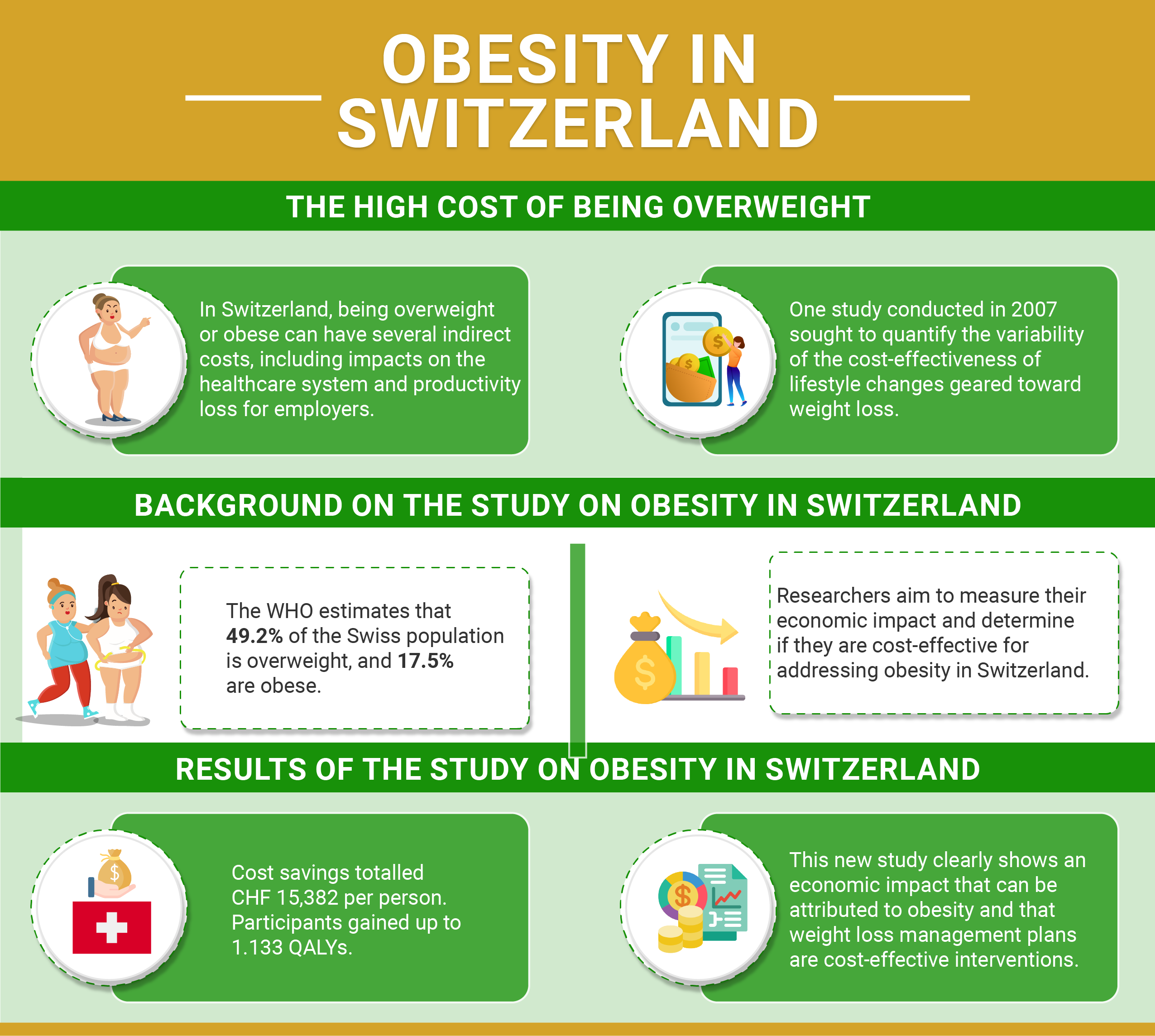In Switzerland, being overweight or obese can have several indirect costs, including impacts on the healthcare system and productivity loss for employers. Measuring the cost-effectiveness of lifestyle interventions for weight loss purposes in Switzerland is a concept that has been introduced previously.

One study conducted in 2007 sought to quantify the variability of the cost-effectiveness of lifestyle changes geared toward weight loss. Though the study indicated some uncertainty regarding the interventions' cost-effectiveness, it conceded that further research needed to be done to draw more accurate conclusions. Years later, it appears that the correlation between public expenditures and the impacts of obesity may have finally been established.
In Switzerland, the prevalence of overweight individuals and those struggling with obesity is a pressing issue, costing the economy millions of dollars annually. The WHO estimates that 49.2% of the Swiss population is overweight, and 17.5% are obese. This is a significant burden on healthcare and the economy, so policymakers must find interventions to treat and prevent obesity.
Weight loss interventions such as meal replacement programs or forms of pharmacotherapy are effective weight-loss methods and can even be sustainable in the long term. Researchers aim to measure their economic impact and determine if they are cost-effective for addressing obesity in Switzerland.
The study mentioned here used a pharmacoeconomic analysis to compare the costs and benefits of three different weight-loss strategies. The first strategy used a pharmacotherapy form of weight loss, the second used a non-pharmacotherapy form of weight loss, and the third was having no intervention at all. To conduct the study, the researchers used data from individuals living in Switzerland who had a BMI of 30 or over.
The study's results showed that the cost savings totalled CHF 15,382 per person. Additionally, participants gained up to 1.133 QALYs. This means that not only did those in the pharmacotherapy group lose more weight than those in the non-pharmacotherapy group, but they also had a higher quality of life.
The results of this study reveal that weight loss management plans are effective for cost-savings for those with Class 1 and Class 2 obesity or those who are slightly to moderately obese. Moreover, the cost savings for Swiss citizens were even more pronounced for those who fall under Class 3 obesity or morbidly obese. This suggests that weight loss programs are an effective way to treat and prevent obesity in Switzerland while also cutting down on public health expenditures.
The study found that the prevalence of obesity and overweight individuals directly impacts the Swiss job economy, with employers losing money each year due to reduced productivity. This loss is due to absenteeism and presenteeism, with obese and overweight employees taking more time off work and being less productive. Furthermore, researchers also found that pharmacological measures for weight loss result in cost savings of 8,975 EUR per class I and II obese patients who partake in a weight loss management plan. This is due to reduced absenteeism, presenteeism, and health care costs. In addition, overweight and obese individuals present a ratio of 6,260 EUR per quality-adjusted life year, which is also due to reduced absenteeism, presenteeism, and health care costs.
In comparing this study to the 2007 study on the economic impacts of obesity and overweight, the outcome is much more apparent. The 2007 study showed that public expenditures were higher for those with obese and overweight. Still, it was unable to determine if there was a correlation between public spending and the impacts of obesity. This new study clearly shows an economic impact that can be attributed to obesity and that weight loss management plans are cost-effective interventions.

Regarding obesity in Switzerland, there is a high cost—both financially and in terms of health—associated with being overweight or obese. This new study shows that participating in a weight loss intervention plan is more effective than other measures, such as pharmacotherapy, and can lead to significant cost savings over time. For policymakers in Switzerland and beyond, this research suggests that weight loss programs are a cost-effective solution for reducing obesity rates and improving public health.
Overall, this study provides valuable insight into the economic impact of obesity in Switzerland and has implications for how public health organizations approach the issue. By targeting overweight and obese individuals with cost-effective weight management programs that combine pharmacological and lifestyle interventions, they can reduce healthcare costs and long-term absenteeism and presenteeism prices, thus improving the economic outlook of Swiss society. Therefore, policymakers must consider these findings when developing strategies to address and prevent obesity in the country.
Obesity and other chronic health conditions are rising, costing the healthcare system billions of dollars annually. But what if there was a way to help people manage their weight before they reach that tipping point?
Now that we know weight loss plans and pharmacotherapy are effective, it is best to find a plan that works for you. With Weight Loss Coach, a team of physicians who are experts in weight loss, you can help individuals create the perfect weight loss plan. This plan includes effective medication, lifestyle coaching, and nutrition plans.
Weight Loss Coach is dedicated to helping those in Switzerland get healthy and reduce obesity rates within the communities. As individuals lose weight and get healthier, they improve Switzerland's overall health. At Weight Loss Coach, we provide valuable resources and support so that individuals can finally lose excess pounds and improve their overall health. We know that losing weight has many health, financial, and lifestyle benefits, and we want everyone in Switzerland to get the opportunity to be their best selves.

Comments